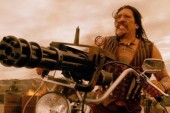
The word meta is thrown around a lot these days. Everything is meta: the internet is meta, jokes are meta, even meta is meta. Watching Before Midnight, I aimed to reign in the term to something less all-encompassing, and something more productive. Too often the terms ‘meta’, and ‘meta-cinema’ are viewed as an ellipses, when it should instead be viewed as a circle, with a clear path from screen to viewer and back to screen.
‘Meta-cinema’ as a term has been twisted into a classification of movies that have impossibly large answers and themes with no reasonable answers. These are the movies that go straight over our heads, leaving behind only the trail of an ellipses which we assume is attached to some magical answer at the end: Inception, Cloud Atlas, Looper. These movies aren’t meta — they’re just vague. If you didn’t really 100% get Inception, and neither did the person next to you, who really did? The movie wasn’t better than you, it just didn’t always make sense.
It’s time we see meta as a loop – something shaped like that ‘undo’ button on old PC’s; as a redirection of attention back to the screen through a hyperawareness, not through distraction and a series of tangential questions. Before Midnight, the third and final instalment of the trilogy (Before Sunrise (1995), Before Sunset (2004)) reminded me why meta can be a good thing, without turning a movie into some eternally unknowable epiphany, or worse — an internet meme.
The series can be crudely summarized in a couple of words: An American man and a French woman travel Europe by train, automobile, and on foot in a series of long takes that are just words: words, words, words, talk, talk, talk. English talk, French talk, Greek talk, cell phone talk, pillow talk, pretentious talk, shit talk, fridge magnet talk. There’s so much talk that we’re not always sure what we’re supposed to pay attention to and what we’re not. Words in other languages just stay words, and words on the fridge become something more. “Don’t play with words,” Celine [Julie Deply] muses at one point. The talk seems so real and natural that at some points you forget it’s movie talk.
Other times, the movie sticks it straight in your face that you’re watching a film — often when it seems playfully pretentious. And playful it is, for the film’s protagonist Jesse [Ethan Hawke] is hyper-aware of these criticisms, as he directly addresses and dismisses these accusations at the beginning of the film. “I’m writing a third book.. it’s not pretentious, it’ll be good” Jesse explains about his third autobiographical novel at the film’s opening. Of course, his book is about people at a movie; all of his characters are watching On The Waterfront, he reveals, while perched on the waterfront. He goes on to explain his thought process behind the book, and consequently director Richard Linklater’s – or fine, my own – thought process behind the film: “It’s not about time, it’s about perception.” He goes on to list a motely crew of characters with brain abnormalities: one character can’t see anything in life without seeing its inevitable end point, another sees everything as déjà vu, one can’t recognize the face of their lifetime partner, the other recognizing a face in everyone he sees. It’s here that the film sets up a treasure hunt of characters throughout the film, dropping hints and clues for a psychic match of “Guess Who?”
The next scene — an extended dinner party conversation — sees another motely crew of characters, and leaves the audience scrambling to match label to character. Characters say things, here paraphrased, like: “I can only the see the end of a relationship,” “I can’t even remember the face of my dead partner of X years,” “everything feels like a dream to me.” Of course these labels seem far too easy to stick right away, and peel off as the night winds on.
The real magic of the film is how its dialogue manages to be completely open for interpretation while avoiding any possible accusations of being vague or overly ambiguous. The expression it is whatever you make it sounds trite and clumsy, and doesn’t quite capture the idea of the film — but it’s something close. Words and words and talk and talk are sometimes meant to be taken at face value, and are sometimes supposed to lead to a great “deeper meaning,” one which Celine mockingly suggests all great books should have, in her best bimbo impression. And sometimes words are just unintelligible sounds.
There’s no way you’ll leave the theatre with the same opinion about what each argument was really about, what was meant to be taken with only a grain of salt, which words were said honestly and open-heartedly, as the person you came with. It’s worth noting that Before Sunset (part II) opens with Jesse commenting on the ending of the first film (doubled as his first novel), as he responded to a claim about its ambiguity. According to Jesse, there was no ambiguity. Cynics saw the cynical ending, and romantics saw the romantic ending, clear as anything. Before Midnight makes you realize that you’re not type-casting the cast, you’re type casting yourself as a viewer (aha! The Big Reveal!). It may not lend itself to as many plotlines as Cloud Atlas, or as many conspiracy theories as Inception, but the film manages to be way more engaging and — yes – meta than either of those films, in its ability to to compliment the film’s characterization with the viewer’s. And hey, if all else fails, you can always say it was all just a dream.
————
Jeremy Schipper is an intern at Toronto Standard. You can follow him on Twitter at @jeromeoschipps.
For more, follow us on Twitter at @torontostandard, and subscribe to our newsletter.













